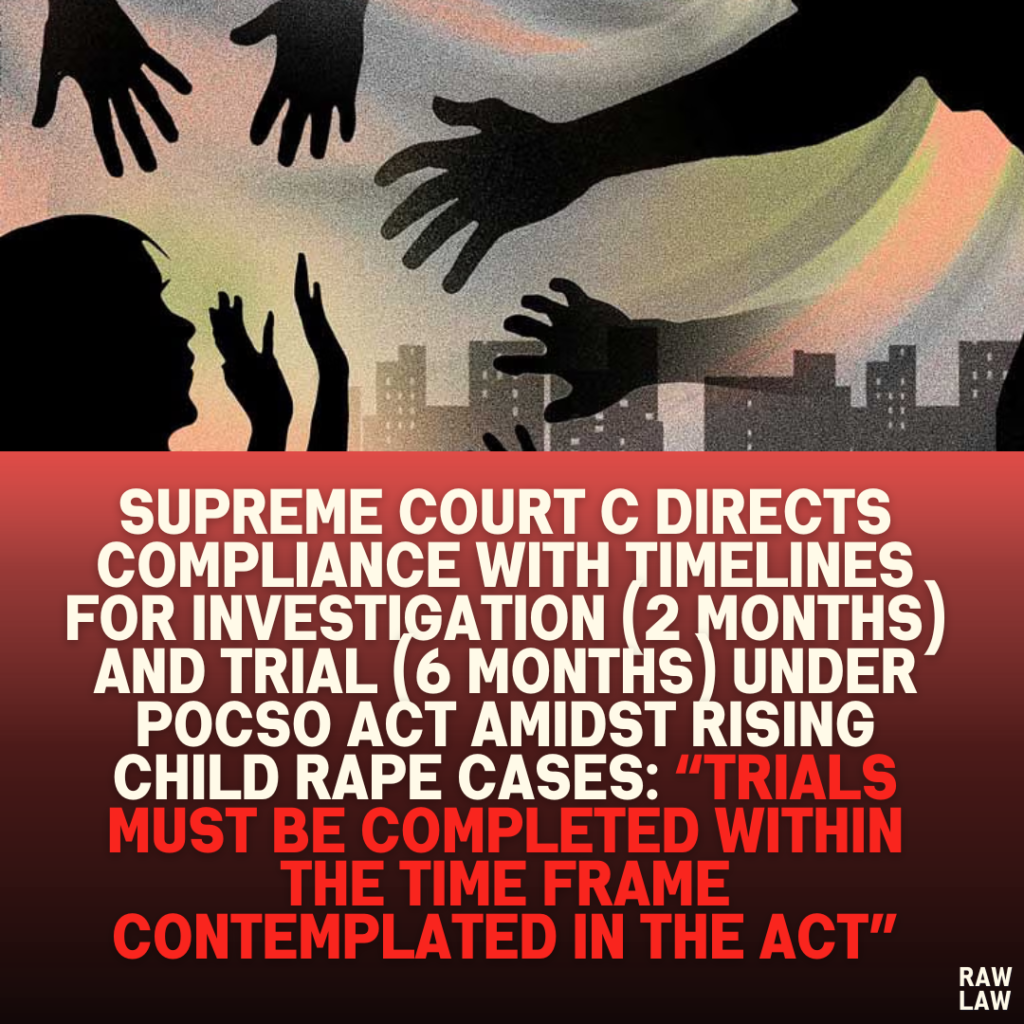Court’s Decision
The Supreme Court closed the Suo Motu Writ Petition titled “In Re: Alarming Rise in the Number of Reported Child Rape Incidents” after issuing a series of critical directions to ensure the effective implementation of the Protection of Children from Sexual Offences (POCSO) Act, 2012. Emphasizing the urgency of the matter, the Court stated:
“The timelines stipulated under the POCSO Act for all stages right from the stage of Investigation up to the stage of Trial… must be adhered to as far as possible.”
It directed the Union of India and State Governments to establish exclusive POCSO Courts, ensure timely forensic reports, appoint trained Special Public Prosecutors and support persons, and raise public awareness on child abuse prevention. The proceedings were formally closed by the bench on May 15, 2025.
Facts
The Court had taken suo motu cognizance on July 12, 2019, in response to widespread media reports highlighting a surge in child rape cases across the country. Pursuant to this, a writ petition was registered to address systemic delays and institutional gaps in investigating and trying offences under the POCSO Act.
Initial directions were issued on July 25, 2019, mandating:
- Exclusive/designated special POCSO Courts in districts with over 100 cases.
- Central funding for judicial infrastructure, prosecutors, and support personnel.
- Sensitization of officials and child-friendly measures in trials.
- Display of child abuse awareness clips in cinemas and public spaces.
Subsequent orders expanded on these directions, seeking data from State Governments and High Courts, emphasizing timely completion of investigation and trial, and advocating for enhanced forensic support.
Issues
- Whether adequate judicial and administrative infrastructure exists to ensure time-bound trials under the POCSO Act.
- Whether State Governments and High Courts have implemented prior directions concerning exclusive POCSO Courts, forensic labs, and sensitization.
- What further systemic interventions are required to ensure child-centric justice delivery under the POCSO Act.
Petitioner’s Arguments
As this was a suo motu petition, no formal petitioner appeared. However, the Learned Amicus Curiae, Mr. V. Giri, made submissions, including:
- Delays in investigation and trial are largely due to lack of forensic support and insufficient number of exclusive courts.
- Dedicated Forensic Science Laboratories should be established in every district to expedite analysis in POCSO cases.
- Greater awareness through public campaigns and a national child helpline is necessary.
Respondent’s Arguments
The Solicitor General, representing the Union of India, and various State Governments submitted compliance reports indicating the steps taken:
- Many States had established exclusive POCSO Courts using Central funds.
- Progress was made in appointing trained support staff and prosecutors.
- However, several States including Tamil Nadu, Bihar, Uttar Pradesh, West Bengal, Orissa, and Maharashtra continued to face high pendency and needed more Courts.
Analysis of the Law
The Court interpreted the legislative intent behind the POCSO Act, which mandates completion of investigation within 2 months and trial within 6 months of filing the charge sheet. It noted that compliance with these timelines is non-negotiable given the vulnerable status of the victims involved.
The Court held that failure to ensure adequate infrastructure defeats the objective of the Act and perpetuates secondary victimization.
Precedent Analysis
While no specific case law was cited in this judgment, the Court’s directions build on its earlier jurisprudence recognizing the need for speedy justice in cases involving vulnerable victims, particularly minors.
Court’s Reasoning
The Court found that despite prior directions, many States had not fully complied. It observed:
“Because of the inadequacy of the number of exclusive Courts for the POCSO Cases, the said timelines mandated in the Act for completion of the trials are not being maintained.”
The Court underscored that only strict adherence to the statute and systemic readiness can uphold the rights of child victims. It reiterated the importance of sensitization of investigating officers, creation of child-friendly courtrooms, and recruitment of competent personnel.
Conclusion
The Supreme Court concluded the proceedings with an expectation that all authorities will:
- File chargesheets within the mandatory period under the POCSO Act.
- Complete trials within the stipulated timeframe.
- Ensure functioning of forensic labs and availability of trained staff.
- Create public awareness and maintain victim/witness protection.
The proceedings were formally closed, and the Court expressed appreciation for the valuable assistance of the Amicus Curiae and other senior advocates.
Implications
This judgment is a strong reaffirmation of the constitutional and statutory rights of child sexual abuse victims. Its implications include:
- Binding directions for Central and State Governments to enhance judicial infrastructure.
- Greater accountability for delay in POCSO trials.
- National focus on timely justice delivery in child abuse cases.
- Institutional mechanisms like child helplines and public campaigns gaining judicial backing.
The judgment reinforces the Supreme Court’s commitment to making the justice system more responsive and child-centric, thereby serving as a foundational step toward systemic reform under the POCSO regime.
